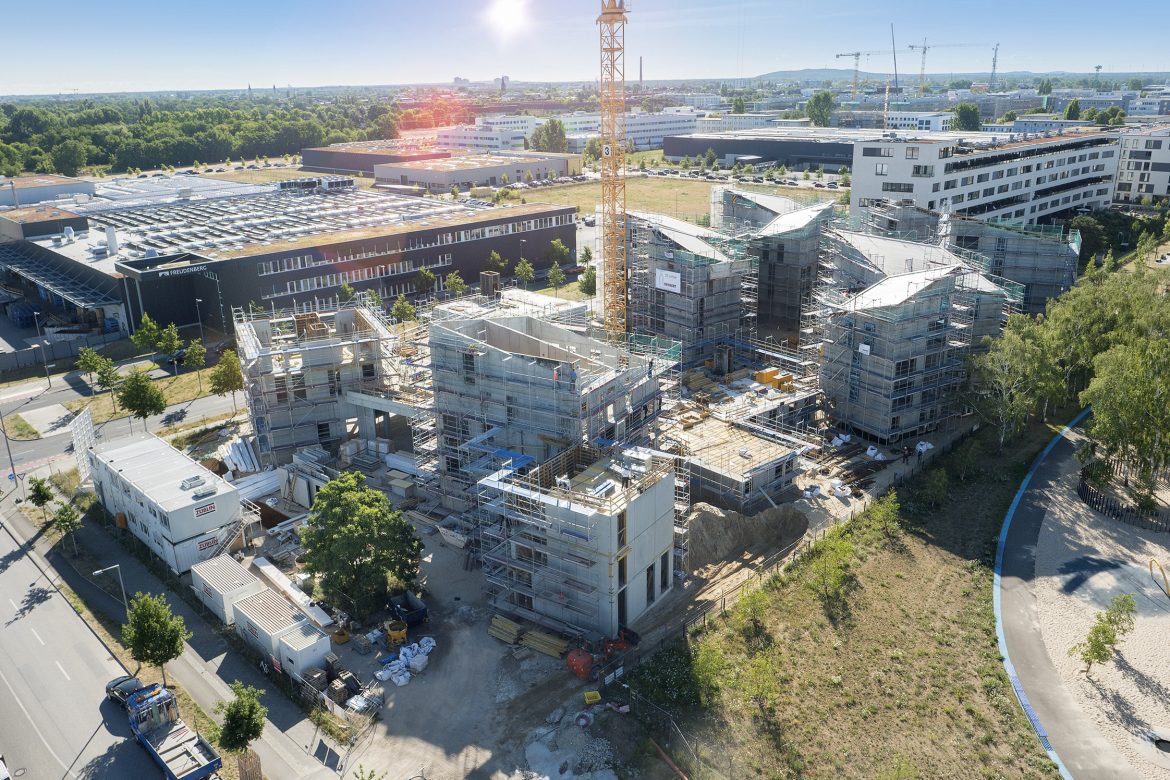The pilot project Future Living® Berlin has been involved in the integration of intelligent solutions in a city district since the beginning of development in 2013. The digital preparation of residential buildings requires a holistic concept. Profitability and sustainability should be ensured for building owners, property operators and residents alike. BIM methods such as the use of a CAFM solution form the necessary basis for the success of projects that deal with the future of living.
Future Living® Berlin – no longer a dream of the future
Since the beginning of the year, the first residents have moved into the urban district Future Living® Berlin. The pilot project started in 2013 and combines residential units of various sizes with commercial units, exhibition areas and places to stay. The central goal of the numerous partners around the initiator GSW (Gesellschaft für Siedlungs- und Wohnungsbau Baden-Württemberg mbh) is the development of an independent ecosystem that integrates intelligent, smart solutions and technologies (Smart Home & Smart Services) and tests them in everyday life and leads to an optimized use of networked products and services by users and providers. In the Future Living® Berlin district, the areas of application for smart buildings – comfort, assistance systems, energy management, security for users and building technology – are covered in full. The central pillar for this is the digital preparation of processes that are assigned to facility management (FM) and that residents usually only perceive when there are problems: high operating costs, breakdowns due to repairs to elevators or lines, loss of a key or even a break-in or lack of barrier freedom.
Smart living and digitalization in facility management
Equipping the district with such a comprehensive smart infrastructure has the goals of working as economically as possible in the usually very costly operating time of a building and of offering users (residents and service providers) a high quality of life and work. Without a central and secure collection of all the necessary data and the ability to intelligently control and handle processes automatically, this is practically impossible. The Kessler Real Estate Solutions GmbH takes over this task with the CAFM system FAMOS in the pilot project. The software solution includes all essential functions of infrastructural (e.g. plant management), technical (e.g. energy management) and commercial FMs (e.g. rental management) beyond the GEFMA standard 444 for CAFM software. By integrating the digital technologies of the operating partners into the CAFM system, Kessler Solutions makes a central contribution to the further development and success of Future Living® Berlin. In detail this means predictive maintenance planning and thus avoiding downtime costs e.g. for lifts, a sustainable energy concept including consumption-based operating cost billing and the quick responsiveness to necessary rescue actions, e.g. when sensors report that a resident has fallen in his apartment.
Use smart opportunities correctly through the 7 dimensions of BIM
In a holistic approach to integrating all building life phases into an overall model, those responsible for the project see further potential for sustainable construction projects, the digitization of FM and the optimized integration of smart products and services. For this purpose, the 7D approach of Building Information Modeling (BIM) is used, which takes time, costs, components to be used with their specific information as well as the operating phase into account in the planning phase. Oriented to the life cycle of buildings, the entire value chain is considered right from the start and what the smart building or neighborhood should do. The consistent and cross-trade collection of all relevant data and the use of a central platform, e.g. via the cloud, which provides this data transparently, enables the interdisciplinary, process-oriented work of all stakeholders across the entire building life cycle. For example, the construction and revision documents will be made available for management after completion. In addition to the continuous and digital documentation and management of data and processes, Kessler Solutions offers additional solutions and services, e.g. for construction project management.
Current challenges in practice
Pilot projects like Future Living® Berlin show numerous potentials of future living and working. There are still a number of challenges to overcome before the concepts become established in everyday practice in construction and facility management. Especially in the field of BIM, these have been heavily discussed in recent years, for example with regard to the various software and hardware requirements of the companies involved, the financial possibilities of using new technologies and processes, the handling of the flood of data (collection and evaluation) or the start of established communication and data transfer processes. Acceptance must be created, willingness to invest must be raised and open data transfer must be made possible in the first place. The partners of Future Living® Berlin try to gain relevant practical experience, e.g. how costly or maintenance-intensive the installation and use of smart technologies is or how smoothly central communication and automated processes actually run.
BIM & Smart Living opportunities for builders, operators and users
BIM-compliant construction enables optimized planning and communication across all stakeholders. This lowers e.g. the risk of additional budgeting and makes it easier to find and correct planning or construction errors. The information gathered in the construction process forms the basis for a more efficient operating phase and the integration of smart technologies over the entire real estate life cycle. Thanks to the automatically recorded data that can be directly used in the CAFM system, management costs are permanently monitored and continuously optimized (e.g. energy efficiency through climate regulation, avoidance of downtime costs through preventive maintenance, time savings through transparent authorities and precise work). The consistent digital documentation enormously simplifies compliance with legal requirements. New business models are emerging for operators as providers of smart services. Kessler Solutions provides a suitable, open platform for the various web services (also from third parties).
For the German version please see Integrale Planung 2020.

